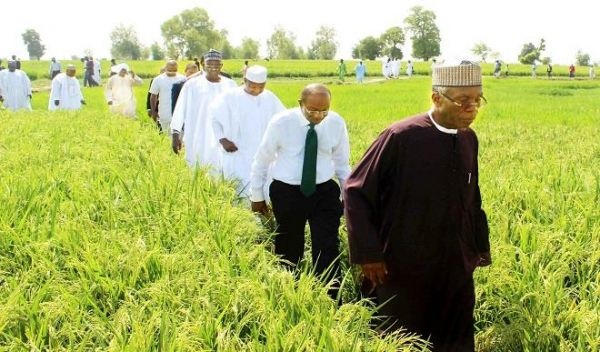…As fear of not recovering N146bn Rice ABP’s loan weakens FG price control
Recent tour of Kano on assessment of the impact of the border closure on the entire rice production value chain, has revealed the deepening intensity of rice farmers and investors to remain in business for long.
During the tour last Thursday, the Minister of Information and Culture, Alhaji Lai Mohammed, in company of the Minister of Agriculture and Rural Development, Sabo Nanono, noted that no fewer than six million people, mostly youths are venturing into rice production following the impact of the border closure on rice value chain.
This is as the recent formation committees across some northern states for the recovering of Central Bank of Nigeria’s Anchor Borrowers Programme (ABP) loans from rice farmers has raised issues of urgent importance and questions on whether the CBN did not securitise the ABP loans before giving them out to farmers in the first instance.
However, there is unconfrimed speculation that why the Federal Government could not place a price tag on Nigerian rice is to allow rice farmers on ABP loan to make more money and repay their loans without stress. since the closure of Nigerian land borders, price of local rice has jumped from N12,500 to N26,000.
Experts say it is unheard of, setting up committees at local governments to recover loans. They argument is that it would be hard to recover loans without adequate security.
Addressing the state Governor, Abdullahi Ganduje, who begged President Muhammadu Buhari to sustain the closure and assistance to rice farmers for Nigeria to attain food sufficiency, Lai Mohammed said “Before the drill, which some people have referred to as border closure, there were 12.2 million rice farmers in Nigeria, according to the Rice Farmers Association of Nigeria (RIFAN).
“The farmers were cultivating rice twice a year. Now, many rice farmers across the country have started three-times-a-year cultivation in order to meet the increasing demand.
“Not only that, at least 6 million people, mostly youths, are now venturing into rice production, meaning that we could hit 18 million rice farmers in no time if the present trend continues,” he said
The Minister averred that Nigeria’s quest to achieve self sufficiency in rice production will be hastened by the increasing activities in the rice production value chain brought about by the border closure, adding that self sufficiency in rice production would also translate to more jobs for millions of people as well as cheaper and more nutritious rice for all.
“We can now tell you, without mincing words, that the border drill has impacted positively on rice production in the country,” he said.
Mohammed said that some farmers were going beyond rice farming and venturing into buying rice paddies and even packaging and marketing.
He said that young farmers were buying small rice mills and off-taking rice paddies from rice farms.
The Minister noted that before the drill started in August, the existing 34 rice mills and the thousands of rice clusters in the country were practically shutting down, due to the pervasiveness of smuggled foreign rice into the Nigerian market.
“In fact, over 200,000 bags of rice were occupying spaces in the warehouses of virtually every integrated rice miller as at that time, according to the rice millers, whose president, Alhaji Mohammed Abubakar Umza, is also here.
“The story of the small scale rice holders or rice clusters was even worse, since they had to abandon their small scale, but valuable means of livelihood.
“Since the integrated rice millers were already struggling to save their businesses by laying off staff and finding other means to pay off their bank loans with mounting interest rates, buying paddies from rice farmers was almost an impossible task.
“So, farmers practically stopped farming, with a devastating impact on the income of those farmers and their families,” he said.
The minister said all the existing 34 rice mills in the country were now producing at maximum capacity, 24 hours a day.
He revealed further that the integrated mills now produce about 150,000 bags of rice every day, translating to 35 million bags annually.
“In addition, the 34 mills are expanding rapidly in order to increase capacity and meet the rising demands.
“More mills are also springing up in all parts of the country and the small scale rice clusters in all parts of the country are now back on stream feeding their local communities,” he said.
Mohammed said the team chose Kano to assess the impact of the border drill on the entire rice production value chain, because the state has the highest number of integrated mills in the country.
He said out of the 34 integrated mills in Nigeria, Kano State alone had 11, in addition to 20 rice clusters.
“An estimated 5000 metric tons of finished rice are turned out daily by the 11 integrated mills and 20 clusters in Kano.
“The ratio is 40 per cent from the integrated mills and 60 per cent from the clusters, while mills, combined, employ about 10,000 people.
The team visited four integrated rice mills which are Al-Hamsad Rice, Kura Brothers Rice Mill, Tiamin Rice Ltd and Umza International Farms, in addition to clusters of cottage rice mills in Kura Local Government Area of the state.
Responding, Gov. Abdullahi Ganduje, said though the partial border closure was inflicting some pains on the people, they were however, temporary inconveniences that must be endured for a better future for the country.
According to him, “We know that there is a kind of conspiracy on this issue from people calling on the President to re-open the border.
“I believe the policy must continue until we reach the next level,” he said.
However, the Governor was silent on the readiness of Kano Rice farmers to repay their loans borrowed under the Central Bank of Nigeria’s Anchor Borrowers programme (ABP).









